ASEE Annual Conference Awards for ENE Faculty and Graduate Students
| Event Date: | June 30, 2020 |
|---|
We honor the many participants who earned awards that were presented online throughout the week.
Dr. Monica Cardella, ASEE Fellow and Lifetime Achievement Award
Dr. Matt Ohland, William Elgin Wickeden Award
Dr. Alice Pawley, Sterling Olmsted Award
Fantasi Curry, Graduate Student, Best Student Paper and Honorable Mention Awards, A Systematized Literature Review of the Factors that Predict the Retention of Racially Minoritized Students in STEM Graduate Degree Programs, Graduate Studies Division
Eunhye Kim, Graduate Student, Best Paper, Problem Reframing and Empathy Manifestation in the Innovation Process, Design in Engineering Education Division
Eric Holloway, recent PhD graduate, Best Paper, Assessing Engineering PhD Students' Research Experiences: What is Important to Assess?", Graduate Studies Division
Justin Major, Graduate Student, Best Diversity Paper, Effects of Test Anxiety on Engineering Students' STEM Success, Educational Research and Methods Division
Dina Verdin, recent PhD graduate, Best Diversity Paper Runnerup, The Influence on Connecting Funds of Knowledge to Believes about Performance, Classroom Belonging, and Graduation Certainty for First-generation College Students, Educational Research and Methods Division
Ronald Clements III, incoming graduate student, Best Overall Paper Runnerup, "Adversary or Ally": Undergraduate Engineering Students' Perceptions of Faculty, Educational Research and Methods Division
ASEE Fellow
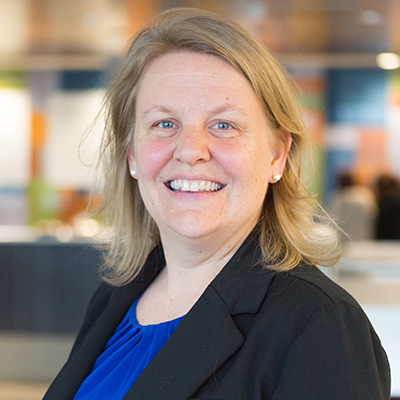
Dr. Monica Cardella
Dr. Monica Cardella, Professor of Engineering Education, has been selected as a Fellow of the American Society for Engineering Education. She was recognized virtually as part of the annual conference. As stated on the organization's website, Fellow status is "one of unusual professional distinction" and is only bestowed upon "an ASEE member with outstanding and extraordinary qualifications."
Lifetime Achievement Award
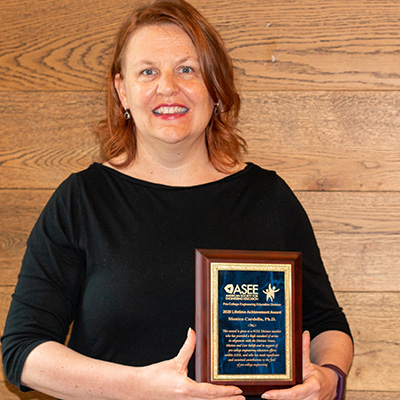
In addition, Dr. Cardella was honored with the American Society for Engineering Education (ASEE) Lifetime Achievement Award from the Pre-college Engineering Education Division for her significant contributions to the field of pre-college engineering.
William Elgin Wickenden Award
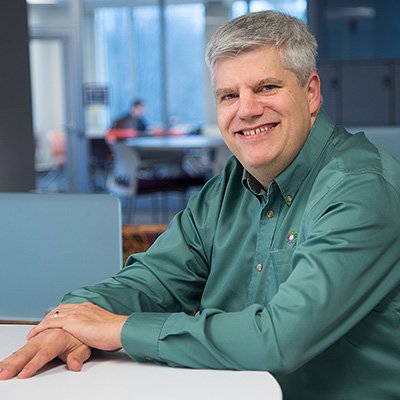
Dr. Matt Ohland
Dr. Matt Ohland has been honored with the 2020 William Elgin Wickenden Award, a nationally recognized award for best papers published in the Journal of Engineering Education. [Acceptance Speech]
"It’s an honor to be recognized by our peers – particularly with the new Wickenden criteria focused on potential for transformative impact. This paper was more than four years in the making – based on feedback from JEE reviewers, it changed significantly and another paper was split off from the original. If you’re having trouble getting a publication out, be persistent and learn what you can from the reviewers/editors." - Matt Ohland
Article: Beyond pipeline and pathways: Ecosystem metrics https://onlinelibrary.wiley.com/doi/full/10.1002/jee.20250
Sterling Olmsted Award
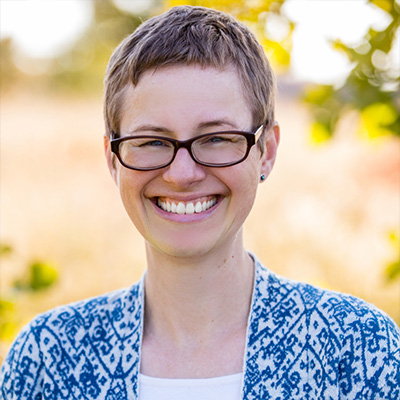
Dr. Alice Pawley
Dr. Alice Pawley, Associate Professor of Engineering Education, was honored with the "2020 Sterling Olmsted Award." This is the highest award given by the Liberal Education/Engineering & Society Division (LEES). The award "honors those who have made distinguished contributions to the development and teaching of liberal arts in engineering education."
Citation Excerpt: Dr. Alice Pawley is a truly outstanding researcher in the field of Engineering Education and a vital contributor to LEES’ mission of supporting pedagogical and societal change. Her innovative scholarship offers unfailingly incisive and constructive address of insistent inequities in engineering as both a professional discipline and an educational field, and we are proud to award Dr. Pawley the Sterling Olmsted Award for 2020. [More]
Best Papers
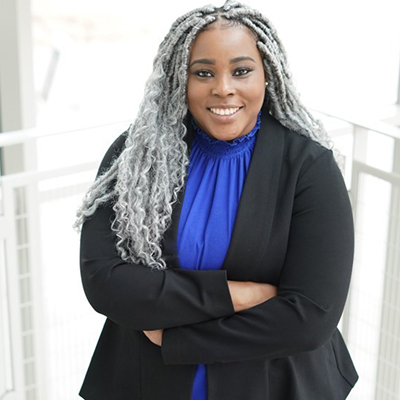 Graduate Studies Division Best Student Paper and Honorable Mention for Best Diversity, Equity, and Inclusion Paper
Graduate Studies Division Best Student Paper and Honorable Mention for Best Diversity, Equity, and Inclusion Paper
First year graduate student Fantasi Curry (pictured right) received two awards for her paper titled "A Systematized Literature Review of the Factors that Predict the Retention of Racially Minoritized Students in STEM Graduate Degree Programs." She was awarded "Best Student Paper" from the Graduate Studies Division and Honorable Mention for the Best Diversity, Equity, and Inclusion Paper Award, both celebrated virtually. Fantasi's co-author is Dr. Jennifer DeBoer.
Abstract
According to ASEE’s 2018 “Engineering by the Numbers” Report, racially minoritized students constituted 19.1% of engineering baccalaureate degrees awarded, 17.4% of engineering master’s degrees awarded, and 12.1% of engineering doctoral degrees awarded across the United States. There is a significant and troubling decrease in the representation of Hispanic or Latinx, Black and/or African American, American Indian or Native American, and Hawaiian/Pacific Islanders as we move up the graduate seniority levels. This is a concern that is mirrored in a lack of continuance to graduate study across all Science, Technology, Engineering, and Mathematics (STEM) fields. While there is currently an extensive body of research on the factors that predict the retention of racially minoritized groups in undergraduate education, it fails to provide scholarly insights or recommendations for practice on factors that impact graduate education. To combat the issue of underrepresentation, it is important for researchers to understand these factors, how they may differ from K-12 and undergraduate levels, and what types of interventions can be put in place to address them. To respond to this need, we present a systematized literature review of articles relevant to understanding the factors that predict the retention of underrepresented and/or racially minoritized students in STEM graduate degree programs.
This systematized literature review found three emergent themes that contribute to the internal attitude to persist and external environment conducive to retention. These themes are grouped by personal factors, social factors, and institutional factors. Findings suggest that there are personal factors that influence minoritized graduate students’ retention such as internal motivation, identity development, perception of support, and resilience towards stereotypes, bias, and past experiences. Social/relational aspects also heavily influence students’ retention through factors such as sense of belonging, discrimination, advisor and faculty support, mentoring, and work-life balance. Furthermore, the results also identify institutional factors as key players in the retention of minoritized graduate students. These factors are department and campus culture, access to URM (underrepresented minority) role models, and vast networks of societies, alumni, and government programs. The amount of information that was available on these minoritized groups in STEM graduate degree programs was a limitation for this study, but it also pointed to an important gap in the literature, which must be addressed in order to create effective interventions that broaden participation in STEM graduate studies and furthermore in the STEM ecosystem.
 Design in Engineering Education Division Best Paper
Design in Engineering Education Division Best Paper
Graduate Student Eunhye Kim (pictured right), Dr. Senay Purzer and their colleagues from the Weldon School of Biomedical Engineering and Office of Engagement received the "Design in Engineering Education Division (DEED) 2020 Best Paper" Award. Their paper, "Problem Reframing and Empathy Manifestation in the Innovation Process" discusses how problem framing and empathy manifestation interplay in the innovation process. As an exploratory study, this study investigates biomedical engineering (BME) students’ reframing processes and decisions in a one-semester design project involving problem definition and concept identification.
Abstract
In the innovation process, design practice involves multiple iterations of framing and reframing under high levels of uncertainty and ambiguity. Additionally, as user desirability is a significant criterion for innovative design, designers' empathy in the framing and reframing process is considered a critical user-centered design ability that engineering students should develop. In this context, this study aims to discuss how problem framing and empathy manifestation interplay in the innovation process. As an exploratory study, this study investigates biomedical engineering (BME) students’ reframing processes and decisions in a one-semester design project involving problem definition and concept identification. This investigation is guided by the following research questions: 1) how do engineering students perceive the relationship between empathy and reframing in the innovation process, 2) how and how often do they make reframing decisions over the stages of problem definition and concept identification, and 3) how different are reframing processes and decisions between teams with higher and lower empathetic design tendency scores? This study was conducted in a junior-level design course, including 76 BME students. We collected and analyzed three data sources: students’ self-reflection reports about their reframing processes, empathic design tendency score, and interviews with selected teams and instructors. The results demonstrated that more than half of the students perceived the connection between empathy and their reframing decisions and that they usually had one reframing moment in the stages of problem definition and concept identification. Also, the findings illustrate triggers for their reframing moments, information sources guiding their reframing processes, changes made through reframing, and influences of reframing decisions on team project processes. Furthermore, the comparison of the selected two teams revealed two differences in reframing processes between the high and low empathic design tendency-scoring teams. The authors believe that the study expands engineering education research on engineering students’ empathy and problem-framing by illustrating students’ reframing processes throughout a design project and exploring the interplay of empathy and reframing processes. Also, based on our study findings, engineering design educators can promote student empathy development by including more project activities and evaluation criteria related to empathic design and providing formative feedback on their reframing processes.
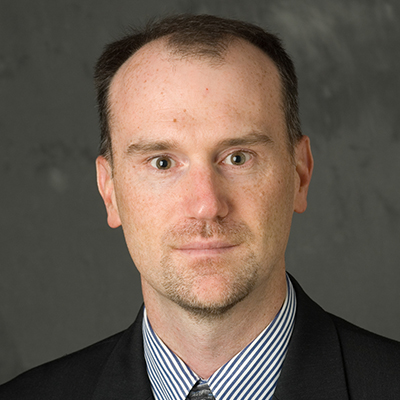 Graduate Studies Division Best Paper
Graduate Studies Division Best Paper
Dr. Eric Holloway (pictured right), a recent graduate of our PhD in Engineering Education program, has received "Best Paper Award" in the Graduate Studies Division for his paper titled "Assessing Engineering PhD Students' Research Experiences: What is Important to Assess?" Eric's co-authors include ENE's Drs. David Radcliffe, Kerrie Douglas, and William Oakes.
Abstract
This paper presents the theoretical support and background literature for developing an assessment to understand how the research experiences of engineering Ph.D. students shape them as future professionals. Many concerns, both in the U.S. and locally at ASEE, have been raised about Ph.D. students being adequately prepared for professional practice. The paper describes the selection of a theoretical framework based on a literature review, and then the application of theory to specify the measurement definitions in the development of an assessment instrument. The purpose of this assessment instrument is to measure how often in their research experience engineering Ph.D. students had an opportunity to practice aspects that are important to career preparation. An extensive literature review was conducted, focusing on what it means to become a professional, and why becoming a professional is difficult, especially for students. Several theories were considered until one, an ontological approach called ‘ways of being’ was selected which explains why students find it difficult to become a professional. Application of this framework, in the form of a review of the literature of the engineering Ph.D. research experiences, identified the five ontological aspects that are most important for career preparation and should be measured by the assessment; viz. (i) working as a team member, (ii) exposure to collaborator’s form of practice, (iii) exposure to relevant professional practice, (iv) modeling and simulation tasks, and (v) practical skills. These five ontological aspects were defined and operationalized for use in the assessment, for which assessment questions can be written as a next step. This paper adds to the limited literature on engineering Ph.D. students’ research experiences by presenting the process of selecting and applying a theoretical framework, literature review, and defining measurements in an assessment.
Education Research and Methods Division Best Diversity Paper
 Graduate student Justin Major (pictured right) received "Best Diversity Paper" in the Education Research and Methods Division for his paper titled "Effects of Test Anxiety on Engineering Students' STEM Success." Justin’s co-authors include ENE graduate student M. Scheidt, Drs. Allison Godwin, Ed Berger, and Dr. John Chen, California Polytechnic State University, San Luis Obispo.
Graduate student Justin Major (pictured right) received "Best Diversity Paper" in the Education Research and Methods Division for his paper titled "Effects of Test Anxiety on Engineering Students' STEM Success." Justin’s co-authors include ENE graduate student M. Scheidt, Drs. Allison Godwin, Ed Berger, and Dr. John Chen, California Polytechnic State University, San Luis Obispo.
Abstract
In this research paper, we explore the impact of test anxiety on first-year engineering students' STEM success. Exams are a prevalent mechanism for evaluating student learning in engineering. However, when confronted with an exam, some students suffer from test anxiety, resulting in detrimental impacts to their performance in engineering. Outside of engineering education, test anxiety has been negatively correlated to GPA. However, there have been few test anxiety-GPA studies in engineering. Studies from other fields, like biology, indicate that there are persistent gender-based "grade anomalies" between women's performance in science courses compared to their overall GPA. Many studies indicate that these results are not due to group differences in ability, but rather structural challenges that differentially affect members of underrepresented groups. Based on this prior work, we investigate the previously studied role of gender and race/ethnicity on levels of test anxiety and performance in STEM; we also explore the role of neighborhood socioeconomic status and first-generation status. Test anxiety was measured using self-reported responses to the Motivated Strategies for Learning Questionnaire (MSLQ). We first used pairwise tests to examine between-group average differences. Then, we examined the relationship between test anxiety and first-year engineering students' grade point average (GPA) in science, mathematics, engineering, and in STEM courses overall as mediated by their group membership. Results suggest test anxiety positively (directionally), but problematically (experiencing anxiety), impacts performance for women in science, mathematics, and STEM overall. We discuss these findings in relation to the STEM “gender filter” further.

Educational Research and Methods Division (ERM) Best Paper Finalists
Dr. Dina Verdin (left), ENE PhD '20, earned Best Diversity Paper Runner-Up for her paper titled "The Influence of Connecting Funds of Knowledge to Beliefs about Performance, Classroom Belonging, and Graduation Certainty for First-generation College Students"
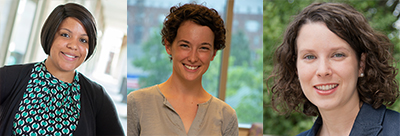
Ronnie Clements, incoming graduate student for Fall '20 (not pictured), along with graduate students Brianna Benedict (left), Jacki Rohde (middle), Dr. Allison Godwin (right), and Sherry Chen (undergraduate, not pictured) earned ERM Best Overall Paper Runner-Up for their paper titled “Adversary or Ally”: Undergraduate Engineering Students’ Perceptions of Faculty."
